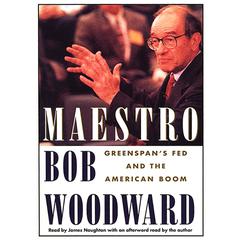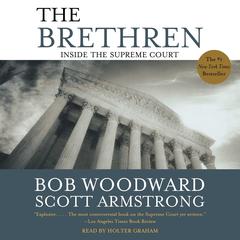 Play Audiobook Sample
Play Audiobook Sample
The War Within (Abridged): A Secret White House History 2006-2008 Audiobook
 Play Audiobook Sample
Play Audiobook Sample
Quick Stats About this Audiobook
Total Audiobook Chapters:
Longest Chapter Length:
Shortest Chapter Length:
Average Chapter Length:
Audiobooks by this Author:
Publisher Description
As violence in Iraq reaches unnerving levels in 2006, a second front in the war rages at the highest levels of the Bush administration. In his fourth book on President George W. Bush, Bob Woodward takes readers deep inside the tensions, secret debates, unofficial backchannels, distrust and determination within the White House, the Pentagon, the State Department, the intelligence agencies and the U.S. military headquarters in Iraq. With unparalleled intimacy and detail, this gripping account of a president at war describes a period of distress and uncertainty within the U.S. government from 2006 through mid-2008.
The White House launches a secret strategy review that excludes the military. General George Casey, the commander in Iraq, believes that President Bush does not understand the war and eventually concludes he has lost the president's confidence. The Joint Chiefs of Staff also conduct a secret strategy review that goes nowhere. On the verge of revolt, they worry that the military will be blamed for a failure in Iraq.
Secretary of State Condoleezza Rice strongly opposes a surge of additional U.S. forces and confronts the president, who replies that her suggestions would lead to failure. The president keeps his decision to fire Secretary of Defense Donald Rumsfeld from Vice President Dick Cheney until two days before he announces it. A retired Army general uses his high-level contacts to shape decisions about the war, as Bush and Cheney use him to deliver sensitive messages outside the chain of command.
For months, the administration's strategy reviews continue in secret, with no deadline and no hurry, in part because public disclosure would harm Republicans in the November 2006 elections. National Security Adviser Stephen J. Hadley tells Rice, "We've got to do it under the radar screen because the electoral season is so hot."
The War Within provides an exhaustive account of the struggles of General David Petraeus, who takes over in Iraq during one of the bleakest and most violent periods of the war. It reveals how breakthroughs in military operations and surveillance account for much of the progress as violence in Iraq plummets in the middle of 2007.
Woodward interviewed key players, obtained dozens of never-before-published documents, and had nearly three hours of exclusive interviews with President Bush. The result is a stunning, firsthand history of the years from mid-2006, when the White House realizes the Iraq strategy is not working, through the decision to surge another 30,000 U.S. troops in 2007, and into mid-2008, when the war becomes a fault line in the presidential election.
The War Within addresses head-on questions of leadership, not just in war but in how we are governed and the dangers of unwarranted secrecy.
Download and start listening now!
"Bob Woodward does it again -- investigative journalism with a look back and forward. Woodward gets it that making decisions in the moment is difficult for anyone, but especially world leaders, and asks hard questions about the impact of those decisions (and sometimes those decisions are the lack thereof). Great information on the decision-making process and explanations of the policy making that this nearly-gone administration has undergone, and why it took them so long to get there with the Iraq War."
— Alisa (4 out of 5 stars)
Quotes
-
“The fullest story yet of the Bush presidency and of the war that is likely to be its most important legacy.”
— New York Times Book Review -
“It is impossible not to be impressed by Woodward’s reporting...His unadorned factual accounts have supplied many other authors and reporters with an invaluable record of what happened and what was said at pivotal junctures during this presidency.”
— New York Times -
“The War Within makes its case quietly and persuasively.”
— Washington Post -
“Brilliantly reported.”
— Los Angeles Times -
“A better first draft of history might be difficult to find.”
— Time -
“Solidly researched and benefiting from insider access, this title will be an essential resource for historians for decades to come, whether or not they agree with Woodward’s conclusions.”
— Library Journal
Awards
-
A New York Times bestseller
-
A USA Today bestseller
The War Within Listener Reviews
-
" An excellent account of the story of the Iraq surge. This is a very detailed account of how national security policy process works. "
— Brendan, 2/16/2014 -
" The last of Woodward's "W" books is slightly more critical of the President but mainly sticks to the inner circle and who was doing what to carry out the war plans of the last administration. With the benefit of 4 years of hindsight, it's easy to see who was wrong, but it's not so easy to see how they could have changed course. "
— Blaine, 2/16/2014 -
" Interesting, but as I was reading it, I kept thinking about the previous book of Woodward's (State of Denial) that I read and how I don't remember much of it. I'm afraid I'll have the same experience with this one, I'm just not convinced I'll retain a lot of it. I'm not sure if that's a reflection of the subject material or how the book was written and if it didn't grab me. Then again, it's probably not that important to retain the details - the overarching message will stay with me - that a lot of people knew the war wasn't working and either didn't try or weren't able to communicate that effectively to the president. Bush, and his role in this, remain a mystery to me. I don't understand his motivation for the passivity he exhibited. "
— Melissa, 2/16/2014 -
" Very insightful so far! To look into the administration and learn how it all got started was very helpful to understand where it all went wrong. "
— Celeste, 1/31/2014 -
" It's time to start understanding what the fuck is going on in Iraq. And this book is my grand kickoff. "
— Mae, 1/24/2014 -
" I eagerly read each of the three other Woodward books in the series and was unable to put them down. I can't decide if I'm just exhausted with the subject matter (Bush and his corrupt administration) or if this one simply wasn't as interesting to me. Regardless, I put this on my Skim bookshelf because, truthfully, I didn't read every word. Skim or not, I was again fascinated by Woodward's apparent access to close sources and secret material and the thoroughness of his investigation. I also find his even-handed treatment of the subject matter quite reassuring that he is delivering as close to the truth as he can. There's positive and there's negative about the Bush years in each of these books, and I've found, looking back, that Woodward's take has been corroborated again and again. Who knows - maybe the surge really will lead to long term gain, not just a blip. "
— Karen, 1/23/2014 -
" Awesome! Crazy! I'm really enjoying the book. We should not have gone to Iraq. I agree with the surge. Lots and lots of mistakes in the Iraq War. Wow! "
— Baden, 1/13/2014 -
" Fascinating. Both for historical importance and portrait of a dysfunctional management process that can apply to many organizations. "
— Sara, 12/25/2013 -
" All I can honestly say so far is "wow".... it is difficult for me to read this book without my blood boiling. "
— Dana, 12/21/2013 -
" This book really opens my eyes to how the war has been run and the poor communication within the administration. It is not dry but very interesting and keeps my attention. "
— Judy, 11/25/2013 -
" No one gets access to Washington like Woodward. "
— Joanna, 11/10/2013 -
" Revealing but redundant and not powerful "
— Jai-shen, 11/10/2013 -
" I will give a full review later. It was refreshing to see an honest job of reporting. "
— Joe, 11/6/2013 -
" Interesting, but I'm finding that I'm not much of a political non-fiction reader. "
— Pam, 7/8/2013 -
" I learned a great deal about the Iraq war and really how complicated the whole mess is. The book dragged in the middle but I found the interviews with Bush interesting. "
— Janet, 5/13/2013 -
" Fascinating book if you're insto politics and why Bush did what he did. I still can't believe that Bob Woodward was able to get so much information. Excellent read. "
— Jan, 2/9/2013 -
" The Bush administration is unbelievably stupid...although I have a new appreciation of Condi Rice. She was the only member of Bush's inner circle who was asking the hard questions thoughout the latest Iraq fiasco. "
— Kenneth, 2/2/2012 -
" This book provides some interesting insight into the backdoor policy making, particularly with regard to the war in Iraq. However, unless you're into politics, it's kind of a slow read. It was hard to get in to, for me. I liked his other book about Deep Throat much better. "
— Carla, 9/17/2011 -
" Better then his last one State Of Denial, which was a good book itself, IMO. "
— Sosiaison, 7/30/2011 -
" This book was like a peek into the inner workings of the Palpatine-Vader administration. At times, though, it was a bit pedantic. "
— Geoffrey, 2/19/2011 -
" Woodward does his homework and tells a good story. Book details the evolution of the surge concept and how other factors played in. "
— B, 2/5/2011 -
" This book provides some interesting insight into the backdoor policy making, particularly with regard to the war in Iraq. However, unless you're into politics, it's kind of a slow read. It was hard to get in to, for me. I liked his other book about Deep Throat much better. "
— Carla, 2/4/2011 -
" Very researched and informative about the inner thoughts and policy decisions during this critical time. But perhaps too much information bogs it down a bit. The denial of leaders as to the true situation and what they had unleashed made it a tough read to move through as well. "
— J, 11/11/2010 -
" Awesome! Crazy! I'm really enjoying the book. We should not have gone to Iraq. I agree with the surge. Lots and lots of mistakes in the Iraq War. Wow! "
— Baden, 6/6/2010 -
" No one gets access to Washington like Woodward. "
— Joanna, 4/29/2010 -
" oY VEY WAS THAT ADMINISTRATION DISFUNCTIONAL RE iRAQ! lEARNED SOME NEW STUFF. lAST OF THE BOOKS ON dUBYA AND ONLY 1 MORE BOOK TO GO & i HOPE i'M DONE READING ABOUT THAT ADMINISTRATION FOR SOME TIME. <br/>(sorry about the capslock) "
— Mark, 4/12/2010 -
" All I can honestly say so far is "wow".... it is difficult for me to read this book without my blood boiling. "
— Dana, 10/13/2009 -
" Excellent insight -- troubling, but I couldn't put it down! "
— Mark, 8/17/2009 -
" Another frightening expose from Woodward offering a glimpse of the horribly inadequate oversight that managed the War in Iraq during Bush's tenure. What Woodward lacks in rhetorical flourish he makes up for in the amazing access he is given to documents, key personnel, and other incredible sources. "
— Jack, 8/16/2009 -
" I was given this as a gift ... it wasn't polemic at all, just a very intriguing picture of how the Bush administration was assessing the Iraq War and preparing to make changes. Well written, informative, involving. I was surprised, but I liked it. "
— Diane, 7/29/2009
About Bob Woodward
Bob Woodward is an associate editor at the Washington Post where he has worked for forty-nine years and reported on every American president from Nixon to Trump. He has shared in two Pulitzer Prizes, first for the Post’s coverage of the Watergate scandal with Carl Bernstein, and second twenty years later as the lead Post reporter for coverage of the 9/11 terrorist attacks.
About Boyd Gaines
Boyd Gaines is an Earphones Award–winning narrator and an actor whose many film credits include Second Best, I’m Not Rappaport, Heartbreak Ridge, Fame, and Porky’s. He’s won two Tony Awards for performances in the The Heidi Chronicles and the musical She Loves Me. On television he has appeared in A Woman Called Jackie, A Son’s Promise, and in the popular series One Day at a Time.



































